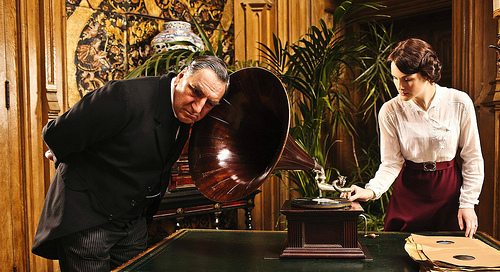Downton controversy a step too far?
Note this article contains spoilers
It may have been described as a ‘glittering period drama’, but ITV’s Downton Abbey also features its fair-share of grit. In recent weeks, creator and writer Julian Fellowes has risked degrading it to no more than an early-20th century version of Eastenders – or so the critics would have you think.
The fresh controversy arose after the episode aired on October 6, in which Lady Mary’s maid, Anna Bates – arguably the nicest, most harmless character of the series – was brutally raped by a guest of the household, Mr. Green. While the attack is occurring, the rest of the family and their servants remain blissfully unaware as they sit listening to opera.
Those that were shocked flocked to Twitter to express their vexation. Much of the criticism labelled the scene as inappropriate and queried whether the rape was being used as entertainment to help draw in a larger audience. Other critics were incensed by the fact that a male writer (Fellowes) had chosen to depict this female trauma.
But is all the uproar really that necessary or well-founded?
First of all, what are they so unimpressed with? That Fellowes is being brave enough to undertake a very real and poignant storyline? I highly doubt that the former actor threw it in merely for added shock value and a boost in the ratings. (That being said, the scheduling of Matthew Crawley’s death on Christmas Day I still consider remiss and utterly ruinous of an otherwise festive day).
Avid fans of the show will of course realise that for all the happiness at the household, harrowing hardships are just as frequent. The award-winning series has famously dealt with cross-class romances, Spanish influenza and pre-eclampysia, as well as the emotional and physical impact of WW1. It’s certainly not all tea-parties and croquet.
And it shouldn’t be. From the opening episode, where the credits rolled over a silhouetted and haunted Downton, the series seemed set to take us to darker places. It is what you might label an embellished realist drama. There is creative license and an added smattering of glamour and gorgeousness among the residents, but it doesn’t gloss over the tensions and troubles that simmered beneath those well-polished societal surfaces.
As viewers, we’re far too easily offended and quick to cry ‘controversy’. For years, TV has been a platform through which to reach a mass audience, providing them with entertainment whilst also engaging them in pertinent political and cultural issues. Downton Abbey is merely assuming a responsibility for TV to do something more than pacify viewers – it is provoking thought and feeling.
Downstairs maids were, no doubt, vulnerable to victimization. Moreover, the stigma for suffering such a trauma, a difficulty that prevents Anna telling her husband, is a huge issue – both then and now – when it comes to discussing rape.
The award-winning series has famously dealt with cross-class romances, Spanish influenza and pre-eclampysia, as well as the emotional and physical impact of WW1. It’s certainly not all tea-parties and croquet.
There is no doubt that it was a shocking and disturbing moment, which many viewers will have found very hard to watch – but since when has that been reason to shelve an issue? As hard as it was to watch, imagine what it was like to write. Fellowes hasn’t sensationalised or fetishized the incident, nor has he disguised it as pure entertainment. Simply put, the scene is efficient in what it shows – somewhat brutal and startlingly frank, yes, but we are shown only the initial assault and its implications, no more. There are no sweeping establishing shots and soft back-lighting.
Afterward, Anna is a dishevelled wreck begging Mrs Hughes for help and your heart can’t help but go out to her.
The subsequent episodes have explored her disintegrating relationship with her husband and the resulting emotional turmoil that the traumatic experience has caused her. It is tackling the consequences of the assault, rather than lingering on the violence of it. Joanne Froggatt, who plays Anna, has defended the story line and says she is “proud of the show” for taking on such a subject and for portraying it in a way that “is not gratuitous at all”.
As for the ‘male writer’ issue that some feminists have brought up, it is worth nothing that many male novelists, screenwriters and directors throughout history have successfully and sensitively dealt with rape. If a female writer were to do so, having not been a victim of it herself, she would be in no better position to commentate.
The point is, Fellowes is encouraging our sympathy for the woman who was attacked, not for the devil that did it. In doing so, he has managed to shed light on the power struggle, oppression and harassment that many women of that era suffered through.
Rape, after all, is a hugely sad reality of life and TV is an interpretation of that reality. If we’re so shocked at witnessing it, perhaps it serves to remind us that we still have a long way to go before we really empathise with rape victims. If we don’t feel comfortable watching it on TV, how are they ever going to feel comfortable talking about it?

Comments